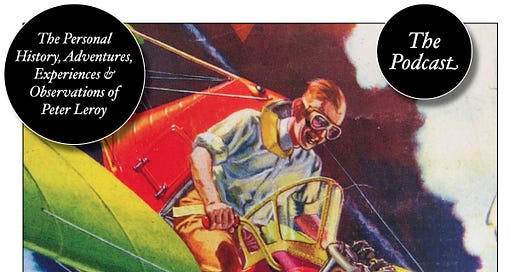“You’ve made up your mind. I see. Well, you must be right, then. Go ahead, go. Don’t let yourself listen to what I’ve got to say, because if you were to start to negotiate, then that ironclad determination you have to make a break, to get out of here at any cost, would be gone.”
“Yeah,” she said. She started for the door.
“If you were to stay and listen to me,” said Porky, raising his voice, “you might decide that change has its price. I mean, look at you now, sniffling and wiping your eyes.” Ariane stopped at the door. Her shoulders dropped. “You’re upset,” said Porky. “You’re upset because, well, because any change is upsetting, even a change for the better. Not that I’m saying this will be a change for the better. Remember, Ariane, that every change carries with it the possibility that it will be a change for the worse.”
“Oh, Porky—” She turned and walked back to the booth. He had made her feel uncertain.
“Another thing: as soon as we’re faced with the actuality of change, rather than some fuzzy, hopeful possibility of change, we begin to feel the loss of the status quo, the present begins to slip into the past, and we immediately begin to feel nostalgic for it. It takes on the same sort of rosy glow we see around certain memories of childhood. Aren’t you feeling that now? Sure you are. Look at the two of us here, we’re mourning the old days when we were lucky if there were two people in here—sharing one order of french fries.”
“Yeah,” she said, and she could feel the nostalgia welling in her, and the fear of change.
“Of course, it’s all a lot of crap,” said Porky, who had never learned to select from among his thoughts. “We want to hold on so much that we’ll even hold on to pain.” He shook his head at human folly. “I remember that when I was a kid, after my mother would pull a sliver from my finger I would want to keep it. I felt a certain affection for it. It was mine in a way. It was part of my history. In some way that I didn’t understand, it was a piece of myself. And this place, Ariane,” he said, seizing the opportunity to make a point, “it’s a part of you.”
He looked around. Ariane looked around.
“Like a splinter?” she said.
Porky frowned. “It’s the place, isn’t it?” he said. “The atmosphere. Too dockside. Too rough-and-tumble.”
“No, Porky,” she said. “This place is—it’s just—right. For what it is. I mean, I like it. Yeah. I do. I’ve always liked it.”
“Well, then, what is it?”
“Oh, Porky. I don’t know. It’s—”
“You feel there isn’t much chance of advancement?” suggested Porky.
“No, no,” said Ariane. “I mean, there isn’t much chance for advancement, but that’s not it. I just—”
“It’s the getup,” said Porky, narrowing his eyes.
“What?”
“The outfit,” he said. “The hat, the skirt.”
Ariane said nothing.
“Ariane,” he said, “so what if it’s ridiculous? It’s no reflection on you. It doesn’t make you ridiculous. None of your friends blame you for the fact that you have to wear a ridiculous outfit here. That’s assumed to be my doing, my tastelessness, not yours. You ought to enjoy strutting your stuff in that little outfit, since you don’t have to take any responsibility for it. You’re just my employee. You’re just doing your job. You’ve got to learn the art of ironic detachment.”
“What?”
“Sure. I’ll bet your friends who have jobs know all about it. I did, when I worked for my father. I didn’t know what to call it, but I knew what it was. It starts when you taste what I call the resentment of the employed. You decide that being in someone’s employ is basically the same as being his slave. Now you have to decide what to do about your situation. You can leave, or you can stay. Well, you need some sort of job, so you might as well stay. Since you’re going to stay, you can go on resenting circumstances, or you can sink into them and consent to be what your master thinks you are, or you can step aside from the whole dirty business. You can say to yourself, ‘It’s not really me in this little skirt and stupid hat, just the me I send to work.’ ”
“Wow,” said Ariane. “You know, I’m going to miss you, Porky. You say the strangest things. A lot of the time I don’t have the slightest idea whether any of what you’re saying makes any sense, but it certainly is thought-provoking.”
“So, why go? Why not stick around and find out what strange thing I’ll say tomorrow—and tomorrow—and—”
She answered with a pout and a wrinkled brow.
[to be continued]
Have you missed an episode or two or several?
You can begin reading at the beginning or you can catch up by visiting the archive or consulting the index to the Topical Guide. The Substack serialization of Little Follies begins here; Herb ’n’ Lorna begins here; Reservations Recommended begins here; Where Do You Stop? begins here; What a Piece of Work I Am begins here.
You can listen to the episodes on the Personal History podcast. Begin at the beginning or scroll through the episodes to find what you’ve missed. The Substack podcast reading of Little Follies begins here; Herb ’n’ Lorna begins here; Reservations Recommended begins here; Where Do You Stop? begins here; What a Piece of Work I Am begins here.
You can listen to “My Mother Takes a Tumble” and “Do Clams Bite?” complete and uninterrupted as audiobooks through YouTube.
You can ensure that you never miss a future issue by getting a free subscription. (You can help support the work by choosing a paid subscription instead.)
At Apple Books you can download free eBooks of Little Follies, Herb ’n’ Lorna, Reservations Recommended, and Where Do You Stop?
You’ll find overviews of the entire work in An Introduction to The Personal History, Adventures, Experiences & Observations of Peter Leroy (a pdf document), The Origin Story (here on substack), Between the Lines (a video, here on Substack), and at Encyclopedia.com.














Share this post